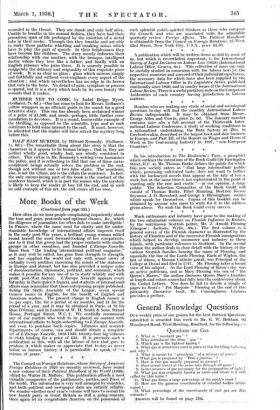More Books of the Week
(Continued from page 335.)
How often do we hear people complaining impatiently about the tons and guns, protocols and optional clauses, &c., which the diligence of journalists too often fails to make intelligible ! In France, where the same need for clarity and for under- standable knowledge of international affairs imposed itself in the early post-War years, a brilliant young woman rallied round herself the most forward-looking of her compatriots, saw to it that this group had the proper contacts with similar
ups in other countries, and founded L'Europe Nouvelle. Since then " the leading international political magazine," as it may well be called, has gone from strength to strength, and has supplied the world not only with sound views of virtually every problem exercising the minds of the statemen in Europe and abroad, but has also provided a unique mine of documentation, diplomatic, political, and economic, which makes it possible for any one of us to study reliably and with profit post-War history. L'Europe Nouvelle appears every Saturday in Paris (price 3 francs), and students of international affairs may remember that these enterprising people published, during the Sixth Assembly of the League, seven special Geneva issues in English, for the benefit of English and American readers. The present charge in English money is Is. per copy, 12s. for a period of six months, and £1 for the period of a year, and it may be obtained in Paris, at 73 bis Quai D'Orsay, and in London at W. H. Smith & Sons, Strand House, Portugal Street, W.C. 2. We cordially recommend any of our readers who wish to be placed an courant with international affairs to begin subscribing to L'Europe Nouvelle, and even to purchase back copies. Libraries and research departments, of course, can and should obtain a complete set of L'Europe Nouvelle, 1918-1930, twenty-four big volumes in cloth binding for a price of £32. It is precisely such a publication as this, with all the labour of love that_ goes to produce it, which makes us appreciate that to-day as never before in human history it is- permissible to speak of " a science of peace."
























































 Previous page
Previous page